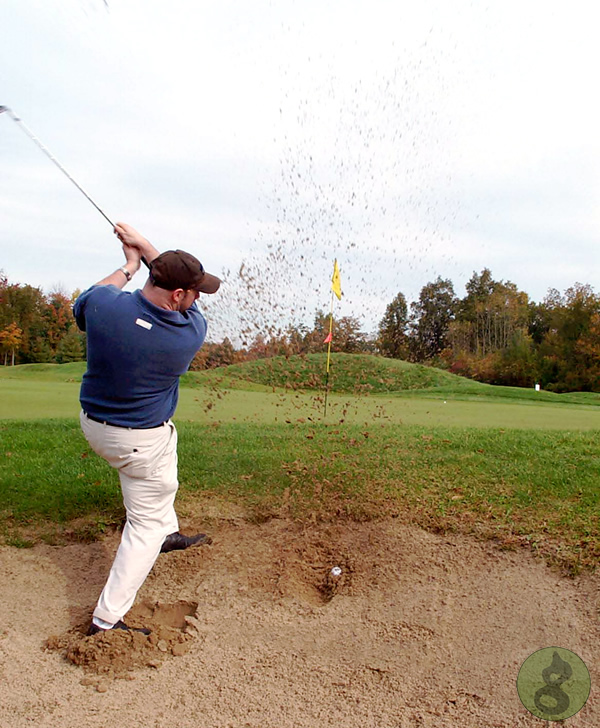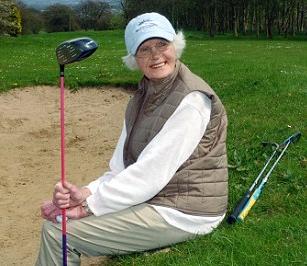
Take a look at the picture above – that’s Stinky Golfer Chris completely missing his ball in the trap on a Gary Player-designed course. Now, based on that shot, do you think he should’ve saved his money rather than playing on a nice, upscale course? Believe it or not, many amateur golfers would answer “yes” to that question.
It just seems odd to me that so many people claim they won’t play great golf courses because they’re simply not good enough. Allow me to toss in my two cents here: That is the worst excuse in the book! Find me where it’s written that only good golfers can play on good courses. The mere notion is ridiculous.
However, let me take a step back for a moment to highlight the difference between “poor players” and “slow players.” I once saw a sign at a course that read: “No one is offended by poor play, but everyone is offended by slow play.” How true that statement is. But it’s been my experience that the really slow players are usually the people that shouldn’t be out on a course to begin with. These are people who have not been properly introduced to the etiquette-side of the game. So, as long as you understand when to pick-up-the-pace and not hold-up every foursome behind you, there’s no reason to think you’re “not good enough” to play a particular course.
Which brings me to the issue of money. People think, “I’d love to play Pebble Beach, but I’d just be throwing my money away.” I feel like saying to them: “Really? Why play at all then? I mean, the next time you play the local muni, you’re still gonna shoot 95, right? Why pay the $40? Just give up the game since you stink so bad. Take that $40 and go out to dinner instead.”
Speaking of going out to dinner, we don’t mind paying more at better restaurants, do we? In general, the best golf courses have the highest greens fees, which makes sense – In general, the best restaurants are usually pricier than your average eatery. Sure, you’re not going to eat at the best place in town every night, but you probably would once or twice a year, perhaps on a special occasion? So why don’t people rationalize this way for where they play golf?
Why do we golf? The answer is simple: We enjoy it. By golfing, we’re rewarding ourselves, even when we play poorly. Want proof? We keep coming back for more no matter how bad our last outing was. Try this: Why did you go to that great steak house on your birthday, or that pricey fusion place on your anniversary? Do you have an answer? Now ask yourself why you shouldn’t experience the best course around by playing the game you love there – even if it is only once or twice a year?




In some countries (Sweden comes to mind) you have to be able to demonstrate a certain handicap to play on some courses. As a golfer, that’s understandable — there are few things worse than watching the once-a-year player trying to navigate the travails and pitfalls of a championship caliber course.
Swedish golfers are not alone in that requirement. From the 2010 Guidelines from the St. Andrews Links Trust: “All golfers playing the Old Course must be in possession of a current official handicap card or certificate on the day of play. A letter of introduction from a home club is not acceptable proof of handicap. The maximum handicap for men is 24 and ladies 36. There are no handicap limits on our other courses.”
It would be great to see that here in the States, but the truth is that times are hard for all golf-related business and that nearly any course that accepts public play with take a golfer of any ability so long as they don’t clog the course with slow play, or damage it with more wear and tear than normal. They are far more interested in getting every bit of income possible.
What’s your handicap Chuck?
12, currently.
A bit of a difference between golf on a great golf course and going to a great restaurant. With the restaurant, you’re pretty much guaranteed to have a good meal – but no such guarantee on the golf course.
It’s one thing to shoot a 95 on a comfort course with no expectations – but going to a great course brings greater expectations – then greater anxiety, poorer play and higher scores…then that miserable feeling that you wasted a lot money to play bad golf.
Charles is right – places like The Old Course, and Sweden, etc. play the percentages that better players will play faster, be more able to handle tougher challenges, keep out the riff-raff.